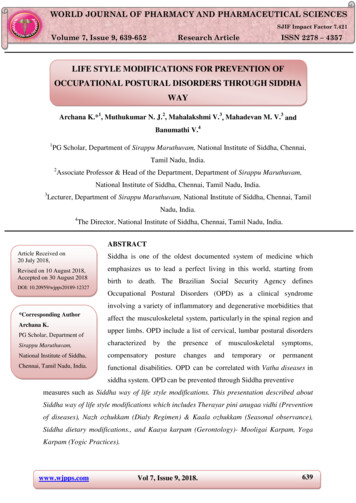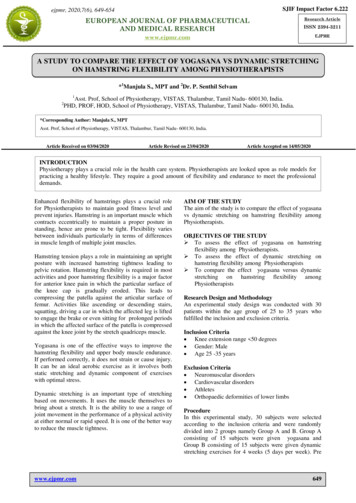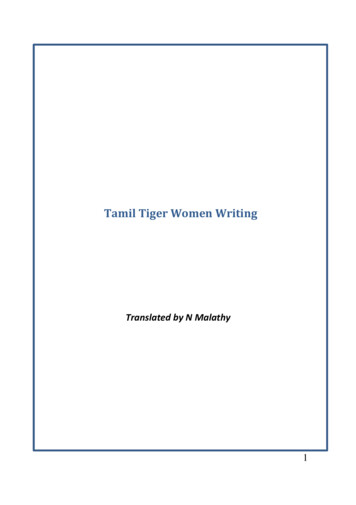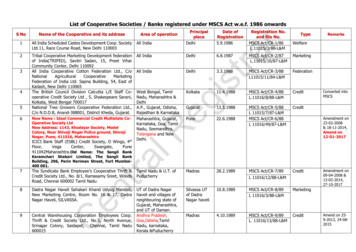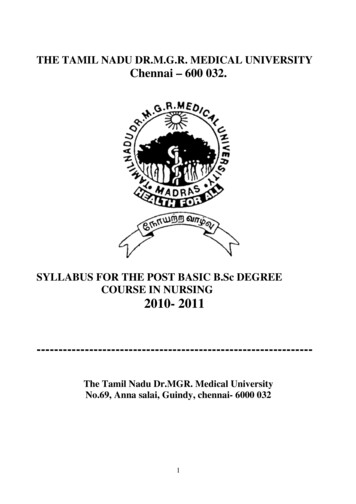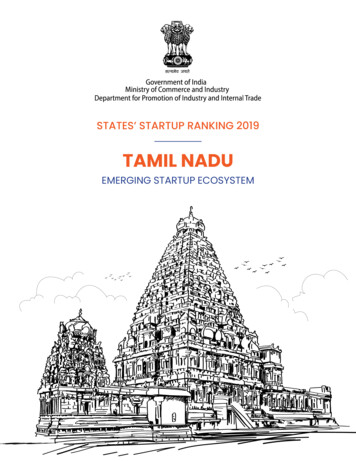
Transcription
STATES’ STARTUP RANKING 2019TAMIL NADUEMERGING STARTUP ECOSYSTEM
2TAMIL NADU EMERGING STARTUP ECOSYSTEM
Table ofContents1. Overview of State Startup Ecosystem.052. Snapshot of State Performance.063. Pillar Wise Assessment.073.1. Institutional Support.073.2. Simplifying Regulations.103.3. Easing Public Procurement.113.4. Incubation Support.123.5. Seed Funding Support.153.6. Venture Funding Support.173.7. Awareness and Outreach.18
4TAMIL NADU EMERGING STARTUP ECOSYSTEM
01OVERVIEW OF STATESTARTUP ECOSYSTEMThe state of Tamil Nadu has been at the forefront of economic development in the country. Entrepreneurship,social mobility, economic growth and technology innovation have defined the growth story of the state. Tofurther tap on the existing potential, the Government of Tamil Nadu launched its startup policy in 2018. Thevision of the policy is to position Tamil Nadu as a global innovation hub and the most preferred destinationfor startups. The policy is valid for a period of five years i.e. 2018 to 2023.Tamil Nadu Startup and Innovation Policy aims to provide an enabling and innovative ecosystem in the state.The key objective of this policy is to enable the state to emerge as the “Knowledge Capital” and “InnovationHub” of the country. It will also attract entrepreneurs and investors across the globe.THE KEY OBJECTIVES OF THE POLICY ARE: Foster the growth of at least 5000technology startups in the state Directly support at least 10 highgrowth startups developing innovativetechnology solutions with high socialimpact Provide supporting infrastructure andstrengthen the existing mechanisms inthe following sectors: Transportation and logistics Electrical and electronics Health care and biotechnology Agriculture Renewable energy Climate change Partner with educational institutions,business entities and investors topromote entrepreneurship in the state Provide incentives and resources tostartups, facilitators, mentors andinvestors Fintech Textile Information Technology (IT) Internet of Things (IoT) Artificial Intelligence (AI) Machine Learning (ML) Software-as-a-Service (SaaS) Reduce the existing regulatory and taxburden on the startup ecosystem Foster the growth of budding startupsdefined as “Startsteps” and enablethem to graduate into startups Create startup hubs across the stateSOME OF THE KEY FEATURES OF THE STARTUP ECOSYSTEM OF TAMIL NADU ARE:Tamil Nadu has emerged as one ofthe leading destinations for startupsworking in the field of SaaSEDII has formed Tamil Nadu Startup andInnovation Mission (TANSIM), headed by anofficer on a full-time basis, to recommendand implement policies and programmesto promote startupsThe state lays special emphasison awareness and learning byconducting bootcamps, hackathonsand events. It also conducts multiplenational and international events forawareness, mentoring, networkingand exposureThe Entrepreneurship Development andInnovation Institute (EDII) in Chennai isthe nodal agency responsible for theimplementation of the startup policy. EDII isa Not-for- profit society constituted by theGovernment of Tamil Nadu to promote aculture of entrepreneurship in the stateTHE STATE HAS A DEDICATED PORTAL FOR STARTUPS (STARTUP-TN.IN) AND IT PROVIDES THE FOLLOWING SERVICES:StartupregistrationLearning and developmentprogrammesInformation on variouspolicy incentivesTAMIL NADU EMERGING STARTUP ECOSYSTEMInformation of events,exhibitions and partnerships5
02SNAPSHOT OF STATEPERFORMANCEThe following representation details status of Tamil Nadu ’s implementation on each of the 7 pillars ofassessment. Data presented below is the percentile score.0%InstitutionalSupport0%Seed FundingSupport0%SimplifyingRegulations0%Venture FundingSupport0%Easing PublicProcurement0%5%IncubationSupportPerformance of theBest State in thepillarRelative Performanceof the StateAwarenessand OutreachTamil Nadu has been evaluated on 7 distinct pillars which largely contribute to the growth of the startupecosystem in Tamil Nadu. The representation as expressed above depicts the relative performance of TamilNadu in each of the seven pillars in comparison to the performance of the best state in that pillar.Although efforts have been made to enhance the startup ecosystem, the initiatives undertaken towards upliftingthe startup ecosystem in Tamil Nadu require improvements since results have been negligible across pillars.While ‘Incubation Support’ shows progress, greater efforts need to be employed by the state for noticeableoutcomes.Detailed analyses of this snapshot can be viewed in the subsequent section, with extensive insight into theinitiatives taken Tamil Nadu to uplift its startup ecosystem.6TAMIL NADU EMERGING STARTUP ECOSYSTEM
03PILLAR-WISEASSESSMENT1. INSTITUTIONAL SUPPORTInstitutional support envisages provisions and execution of the state’s startup policy includinginformation on the nodal team within the state, online implementation system, registration ofmentors and their listing on the state startup portal. The states are evaluated based on the laidprovisions along with parameters of availing benefits through state intellectual property rightsportal, establishing partnerships with institutions, providing special incentives for women ledstartups and entrepreneurship.KEY FACTS The startup policy has clear guidelines on the definition of a startup if it meets the following conditions: An entity working towards innovation, development or improvement of products or processes or services, or if it is usinga scalable business model with a high potential of employment generation or wealth creation Registered in the state under the Tamil Nadu Startup and Innovation Mission (TANSIM) The date of the entity’s incorporation/registration is not prior to seven years In case an entity is engaged in the biotechnology, artificial intelligence and machine learning sectors, the date ofincorporation should not be prior to ten years The annual turnover should not exceed INR 25 crore The startup policy is accessible on the state’s startup portal and is sector agnostic, as the incentives and benefits offeredto startups are not restricted to any specific sector. The state proposes to identify and empanel private Intellectual Property (IP) support centers to provide IP related support tostartups. They would primarily serve as patent information centers and intellectual property facilitation centers. The state has empanelled an intellectual property facilitation center at Anna University in Chennai. Additionally, support inIP creation and monetisation has been taken up by Tamil Nadu Technology Development Center, in collaboration with theConfederation of Indian Industry (CII). Electronic Communication of Tamil Nadu Limited has signed a Memorandum of Understanding with Agni College ofTechnology in 2019 to provide infrastructural support and regulatory facilitation for establishment of 300 startups in the state.KEY STRENGTHSROBUST ONLINE IMPLEMENTATION SYSTEM The state has a robust startup portal (Startup-tn.in) whichprovides the following information for all stakeholders ofthe startup ecosystem: Registration process for startups Helpdesk for resolution of queries that can be accessedvia email and phone Detailed list of incubators and mentors along with theircontact details Detailed list of events and workshops Learning and development programmes Information on various policy incentivesTAMIL NADU EMERGING STARTUP ECOSYSTEM7
EDII – Tie Woman Summit 2019In 2019, EDII in collaboration with TiE Coimbatoreconducted a summit, exclusively for women. It wasa one-day programmes with the intent to createawareness amongst women through presentationsfrom successful entrepreneurs and startup innovatorsacross the state Summer Sandbox Programmes for Women 2019In 2019, MadeIT Innovation Foundation, in partnershipwith EDII, conducted a fifteen-day workshop for aspiringwomen entrepreneurs at Indian Institute of InformationTechnology Design and Manufacturing (IITDM),Kancheepuram’s campus in Chennai. The three-weekaccelerator programmes was focused on enhancingskills of women, specialising in the manufacturingsector.DEDICATED TEAM FOR GUIDING STARTUPS The state has a robust startup cell called Tamil NaduStartup and Innovation Mission – with a team of 15 members to provide dedicated support to startups.PROVIDEDTOWOMEN The startup policy provides the following incentives tosupport women entrepreneurs: Training and sensitisation programmes for womenentrepreneurs Startups with women founders or co-founders areeligible to receive support for product development,marketing and participation in fairs and exhibitions Priority for women led startups in allotment of industrial plots Support for women entrepreneurs to set up incubators Startups addressing issues related to women are alsoeligible for the above-mentioned support Key programmes conducted to benefitentrepreneurs are summarised on the right:8womenKEY STRENGTHSSTRONG SUPPORTENTREPRENEURS Food Safety and Quality Assessment Course 2018EDII collaborated with Golden Jubilee Biotech Park forWomen (GJBPW) to conduct a workshop on food safetyand quality assessment. The objective of the workshopwas to provide a platform for younger women aspirantsto develop and enhance their skills in the area of foodsafety and quality.It was a five-day programmes. Hi-Rise Food tech Laband Spinco Biotech Pvt. Ltd. were technical partnerswho assisted in practical sessions for the programmes A yurceutical and Nutraceutical Workshop for Women2019This workshop was organised by EDII and GJBPW. Thekey aim of the workshop was to provide a platform towomen aspirants working in the field of life sciences todevelop and enhance their skills in entrepreneurship.The programmes was organised at the Golden Jubileebiotech park in Chennai Winter Sandbox Programmes for Women 2018In 2018, MadeIT Innovation Foundation, in partnership withEDII, conducted a 15-day workshop for aspiring womenentrepreneurs at IITDM Kancheepuram’s Campus inChennai. The three-week accelerator programmes wasfocused on enhancing skills of women, specialising inthe field of manufacturingTAMIL NADU EMERGING STARTUP ECOSYSTEM
WAY FORWARDThe state needs to give importance to this pillar in order to further strengthen the startupecosystem. The state could prioritise actions required in three categories: short, medium andlong term. Action required in each of these categories are summarised below:SHORT TERM ACTIVITIES (1-3 MONTHS)The activities suggested in this category are important and will take relatively less time for implementation. Through dedicated efforts,results can be achieved within one to three months. Activities suggested under this category are summarised below:Improve features of the startup portal Currently, the startup portal does not have a tracking system for verification of the application status for registration of startups. Thestate could provide the functionality of tracking the status of the applications for registration. The state is encouraged to enable issuance of online registration certificates for startups.Establish dashboard for displaying the current state of the startup ecosystem The state could consider having a dashboard on its startup portal that will show the current state of the startup ecosystem of TamilNadu. The information could display the number of startups registered, number of incubators, number of seed and venture funds and itcould be month-to-date or year-to-date specific. The portal could also display the number of disruptive startups registered in Tamil Nadu and the quantum of funding received throughseed and venture funds.Develop an online mechanism for providing mentorship support The state could develop a mechanism to connect mentors to startups on its portal. This will facilitate interaction between the mentorsand the startups in the state. The state could provide complete contact details of mentors along with a brief description of their experience on the startup portal.MEDIUM TERM ACTIVITIES (4-6 MONTHS)The activities suggested in this category are important and will take relatively more time for implementation. Through dedicated efforts,results can be achieved within four to six months. Activities suggested under this category are summarised below:Provide Intellectual Property (IP) support to startups The state could consider providing financial incentives/ subsidies to startups for filing patents/ trademarks. The subsidies could be inthe form of grants and reimbursements which would be used to cover the costs incurred by startups to file for patents and trademarksFacilitate support from various departments The state is encouraged to rope in institutional support from various departments, across sectors to strengthen the startup ecosystem. The support to startups could be extended through sustainable programmes such as grand challenges, hackathons, incubation, seedfunding, angel and venture funding organised by other state departments. The state is encouraged to further strengthen co-ordination from various departments to enhance the startup ecosystem. This wouldhelp in better implementation of schemes under the respective departments.Increased partnerships with institutions and enterprises The state could focus on building partnerships with business houses, corporates, and/ or educational institutions for extending theirassistance to state-based startups. The state is encouraged to include details of the partnerships with institutions and business enterprises to support startups on the stateonline porta.lTAMIL NADU EMERGING STARTUP ECOSYSTEM9
2. SIMPLIFYING REGULATIONSSimplification of regulations considers mandatory requisites for state level approvals and clearances forregistering and operating a business or startup online. In order to make compliance for startups friendlyand flexible, simplifications are required in the regulatory regime. It encapsulates regulatory issues facedby registered startups which have been identified through an interactive online mechanism subject toapproving action by regulatory agencies. The states are evaluated based on the support provided tostartups by introducing a list of rules, regulations or Acts in the state, including amendments in the Actsand regulations with requisite details to create a conducive environment for the state’s startups.KEY FACTSThe following actions are envisioned in the startup policy to ease the regulatory environment for startups: An online portal supported by a helpdesk to enable startups to apply for clearances The portal would also have an online time bound grievance redressal mechanism for startups Simplification of existing labour laws and technical regulations to make it easier for startups to comply Self-certification mechanism for startups where there are no technical regulations which need to be complied with, suchas compliance with employee provident fund organisation, minimum wages, bonus, gratuity etc. TANSIM engages with the state government in formulating policies for startups working in emerging and disruptive areasas well as dismantling outdated regulationsWAY FORWARDThe state needs to give importance to this pillar in order to further strengthen the startupecosystem. The state could prioritise actions required in three categories: short, medium andlong term. Action required in each of these categories are summarised below:SHORT TERM ACTIVITIES (1-3 MONTHS)The activities suggested in this category are important and will take relatively more time for implementation. Through dedicated efforts,results can be achieved within four to six months. Activities suggested under this category are as follows:Establish an interactive online Business Compliance Information System In line with its objectives mentioned in the startup policy, the state is encouraged to develop an interactive mechanism for obtainingstate level approvals and clearances. The state could add a chat bot to the main website. This will help in real time problem-solving for startups and lead to customisedresponses instead of standardised frequently asked questions (FAQs) which are currently available on the website.MEDIUM TERM ACTIVITIES (4-6 MONTHS)The activities suggested in this category are important and will take relatively more time for implementation. Through dedicated efforts,results can be achieved within four to six months. Activities suggested under this category are summarised below:Establish a mechanism to invite and identify regulatory issues In order to achieve the objectives of its startup policy, the state could develop a grievance redressal mechanism to identify andcomprehend the regulatory issues faced by startups. A time-frame could be provided on the portal for resolution of issues faced bystartups in the state. The state could consider publishing a comprehensive list of regulatory issues faced by startups in Tamil Nadu and the solutions offered.This would enable startups to understand the regulatory environment of the state in a more comprehensive manner which wouldminimise the number of queries submitted on the portal. The state is encouraged to host pre-drafting consultations through online and offline mode by inviting feedback/ comments on draftingpolicy or regulations from various stakeholders of the startup ecosystem and amend regulations accordingly.10TAMIL NADU EMERGING STARTUP ECOSYSTEM
Amendments in rules and regulations or acts to support startups in disruptive areas In order to implement the measures proposed in its startup policy for disruptive startups, the state could amend its rules and regulationsto support such startups in the state. This would help to create a wave of entrepreneurship in areas of businesses which are minimallyexplored. The state could conduct quarterly roundtables/workshops for disruptive startups to understand their regulatory issues. This wouldinclude a two-way communication between such startups, and relevant government departments aimed at direct consultation andgrievance redressal.TAMIL NADU EMERGING STARTUP ECOSYSTEM11
3. EASING PUBLIC PROCUREMENTEase in public procurement simplifies criteria to ensure participation of startups in government tenders.The states are evaluated based on the support provided to startups in resolving issues related to statepublic procurement as norms of Earnest Money Deposit (EMD), prior experience, and prior turnover whichprove to be barriers for participating startups. Easing of such norms enable startups and entrepreneursto avail exemptions and share an equal platform with established organisations.KEY FACTSUnder the startup policy, the following actions are envisioned by the state to ease public procurement: The policy has provisions for relaxation in the criteria of prior experience, prior turnover and EMD in public tenders toencourage startups to participate in public procurement activities. It also states that all the procurement preferences given to micro, small and medium enterprises in public tenders shouldbe extended to startups. The state proposes to facilitate procurement of products/services of impactful startups on a pilot basis. State government departments and undertakings plans to avail services of startups for low value procurement, subjectto the condition that the concerned department does not purchase more than two products/ services in a given financialyear from a single startup. TANSIM shall act as a tender/public procurement information center for startups.WAY FORWARDThe state needs to give importance to this pillar in order to further strengthen the startupecosystem. The state could prioritise actions required in three categories: short, medium andlong term. Action required in each of these categories are summarised below:SHORT TERM ACTIVITIES (1-3 MONTHS)The activities suggested in this category are important and will take relatively less time for implementation. Through dedicated efforts,results can be achieved within one to three months. Activities suggested under this category are as follows:Increase participation of startups in public procurement activities The state could consider awarding work orders to startups to encourage entrepreneurship. The state could consider organising annual events where startups can demonstrate their capabilities directly to the government andsubsequently take part in public procurement activities.Provide preference in public procurement to startups The state could provide preference in public procurement to startups by reserving a certain percentage of value of goods to beprocured from local startups by state government departments and public sector companies.Establish a grievance redressal mechanism for startups The state is encouraged to establish a dedicated online and offline mechanism for resolving grievances of startups specifically relatedto public procurement. The state could also assign a dedicated officer to oversee the redressal of grievances and ensure that timely resolution is provided tostartups.12TAMIL NADU EMERGING STARTUP ECOSYSTEM
4. INCUBATION SUPPORTIncubation support is an integral element of the startup ecosystem that supports entrepreneurs to growtheir businesses and assists new startups to succeed. In order to promote startups, the state governmentscollaborate with organisations, corporates or industry associates to establish incubators, to support startups inthe form of capital expenditure or operational expenditure. The evaluation is based on setting up of incubatorssupported by the state governments to release funds to the startups, thereby creating a unique mechanismto provide subsidised incubation and operate acceleration programmes in partnership with the industry.KEY FACTSThe state, through its state startup policy, assists in setting up of new incubators and aims to provide adequate resources foracceleration of startups. Key action plans envisioned in the startup policy are: To encourage industrial organisations and private commercial organisations to setup incubators/ accelerators using fundsallocated under schemes of Niti Aayog, Department of Science and Technology (DST), Department of Biotechnology (DBT),Department of Electronics and Information Technology (DEITY) and the Ministry of Micro, Small and Medium Enterprises(MSME), Government of India. To target corporate social responsibility funds to promote corporate and private incubators. State departments and publicsector companies would be encouraged to support incubators by using their corporate social responsibility funds. Theseincubators shall also serve as an innovation sandbox to solve problems faced by public sector companies. To establish a learning & development team at the TANSIM. To allocate land to entrepreneurs at nominal lease for a duration of 99 years to establish ‘Startup Parks’. To establish sector specific niche incubators. To establish government funded incubators that would be open for public access at least 16 hours a day and seven daysa week, except on national and state holidays. To develop technology business incubators under the brand ‘incubaTN’. To encourage entrepreneurs by giving them access to relevant data/ information to create applications and technologiesfor the welfare of the public. To set up a fund called Tamil Nadu Startup Seed Grant Fund (TNSSGF) which would provide up to a maximum of INR 50 lakhto academic incubators and private technology business incubators.KEY STRENGTHS In 2018, the state, in collaboration with educationalinstitutions, proposed to set up 10 incubation centersacross the state under Tamil Nadu Manufacturing BusinessIncubation Infrastructure Development Project As of now, the state has extended support to 7 educationalinstitutions for the establishment of incubators. Details ofthe same are as follows: Veterinary incubation foundation at Tamil NaduVeterinary and Animal Sciences University in Chennai Agri-Business incubator at Anbil DharmalingamAgriculture College and Research Institute inTiruchirappalliKEY STRENGTHSCONGENIAL ENVIRONMENT FOR GROWTH OFINCUBATORS Agroforestry business incubation center at the ForestCollege and Research Institute in Mettupalayam Killikulam Agri-Business Incubator at Agriculture Collegeand Research Institute IOT incubation center at the Sri Krishna College ofTechnology in Coimbatore Innovation and incubation research foundation atAnnamalai University in Chidambaram The state has allocated 7 seats in two state supportedincubators Horti-business incubator at the Horticultural College andResearch Institute in PeriyakulamTAMIL NADU EMERGING STARTUP ECOSYSTEM13
WAY FORWARDThe state needs to give importance to this pillar in order to further strengthen the startupecosystem. The state could prioritise actions required in three categories: short, medium andlong term. Action required in each of these categories are summarised below:MEDIUM TERM ACTIVITIES (4 - 6 MONTHS)The activities suggested in this category are important and will take relatively more time for implementation. Through dedicated efforts,results can be achieved within four to six months. Activities suggested under this category are summarised below:Offer additional incubation support and increase participation of stakeholders The state could support more incubators through subsidies in the form of grants. The state could consider special types of grants suchas those that complement funds/grants by corporates, academic institutions or central government Greater focus could be given to advertise incubation programmes to enable higher participation of relevant stakeholders of the startupecosystemConduct additional acceleration programmes and increase participation of startups The state could conduct additional acceleration programmes, in partnership with industry and formulate measures to promoteinnovation and encourage industry participation The state could encourage enrollment of startups in acceleration programmes to provide startups with the opportunity to connect withinvestors and mentors14TAMIL NADU EMERGING STARTUP ECOSYSTEM
5. SEED FUNDING SUPPORTSeed funding can be in the form of a direct grant, subsidised loan, product development andmarketing financial assistance, monthly sustenance allowance or even equity seed funding. Withseed funding, the evaluation is based on the states’ endeavor to help a business grow and generateits own capital by establishing a guideline document. The states need to ensure that startups scalewith the right velocity in order to achieve leading positions, through state investment and startup’sentrepreneurial knowledge.KEY FACTSThe state has provided guidelines for startups to avail benefits under two policies - Innovation Voucher Programmes andTamil Nadu Grand Innovation Challenge. Funding is released in tranches as per the milestones agreed upon in the memorandum of agreement. The guidelinesare elaborate, and the application procedure is transparent. Over the past few years, the state has annually conductedpitch fests and startup manias for startups to avail seed funding. In addition, the state startup policy has mandated the setting up of Tamil Nadu Startup Seed Grant Fund (TNSSGF) ofINR 50 crore in partnership with financial institutions and universities, for supporting early stage financing requirementsof the startupsKEY STRENGTHSDETAILED SEED FUNDING GUIDELINES Quantum of support offered under each policy and details onthe policy are summarised below: Innovation Voucher Programmes Innovation Voucher Programmes (IVP) is one of theflagship schemes of the Tamil Nadu Government. Throughthis scheme, the state intends to provide support to 400entrepreneurs per year. Further, the main focus of theprogrammes is to build cohesive partnerships amongstthe state, industry players and educational institutions A seed grant of up to INR 5 lakh per startup can beprovided for:9 Market potential analysis9 Market entry and product developmentKEY STRENGTHS The state has detailed operating guidelines for availing fiscalincentives under the Innovation Voucher Programmes andTamil Nadu Grand Innovation Challenge. The schemes clearlymention the eligibility criteria, extent of seed funding, quantumof seed funding and application procedure. The funds are disbursed through EDII Seed funding is provided through Tamil Nadu Innovation GrandChallenge (TNIGC) TNIGC is an initiative taken by the state to promoteinnovation and startup culture within the state Through the challenge, seed grant of up to INR 5 lakhper startup can be provided to the winners of the grandchallenge The state has provided seed funding support to 15 startupsthrough grants and reimbursements. These beneficiaries weresupported through the Innovation Voucher Programmes andTamil Nadu Innovation Grand Challenge. The state maintains a detailed list of startups that haveobtained seed funding, with specific details on the amountdisbursed and date of disbursement of funds.TAMIL NADU EMERGING STARTUP ECOSYSTEM15
WAY FORWARDThe state needs to give importance to this pillar in order to further strengthen the startupecosystem. The state could prioritise actions required in three categories: short, medium andlong term. Action required in each of these categories are summarised below:SHORT TERM ACTIVITIES (1-3 MONTHS)The activities suggested in this category are important and will take relatively less ti
Establish dashboard for displaying the current state of the startup ecosystem The state could consider having a dashboard on its startup portal that will show the current state of the startup ecosystem of Tamil Nadu. The information could display the number of startups registered, number of incubators, number of seed and venture funds and it
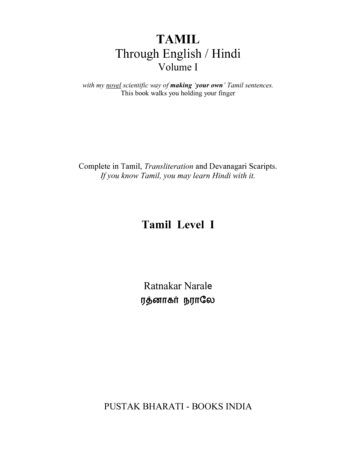
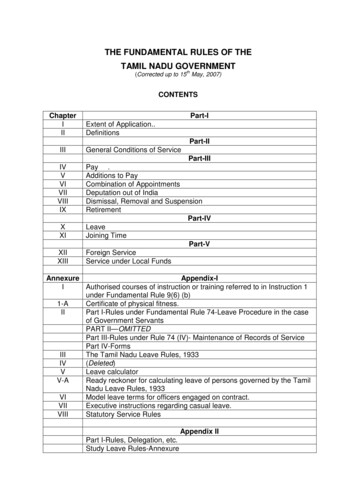
![Tamil Computer Magazine Free [WORK] Pdf](/img/63/tamil-computer-magazine-free-download-pdf.jpg)
![Tamil Ilakkiya Varalaru In Tamil Pdf Free [PORTABLE] - Jbr Films](/img/63/wenslato.jpg)
